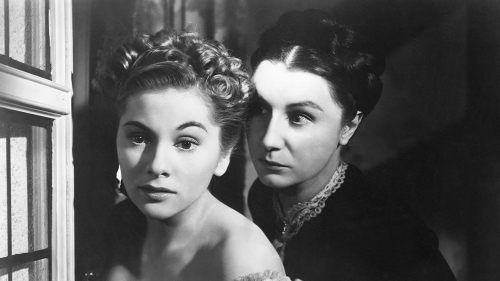Shared Superstition In REBECCA And PHANTOM THREAD
Phantom Thread is in theaters now. Get your tickets here!
In Alfred Hitchcock’s 1940 film Rebecca, a film which happens to be his first American production, the somber widower Maxim de Winter marries a girl with no name – at least, her name is never revealed, for it is not she who adorns every towel and handkerchief and address book with her initial, but Rebecca, the late wife whom this naïve newcomer will never live up to. Likewise, in Phantom Thread, a film which happens to be Paul Thomas Anderson’s first British production, our leading lady and love interest to fashion designer Reynolds Woodcock, Alma – a name which also belonged to Hitchcock’s wife – struggles to compare to the memory of Reynolds’ deceased mother. One of Reynolds’ last interactions with his mom was sewing her wedding dress by hand, with the aid of his sister Cyril, an experience which, according to urban legend, would prevent them both from ever becoming happily married. Both experiences leave the men in these women’s lives feeling cursed, and leave the women involved with the impossible task of ridding the air of a ghost and the indelible mark these spirits left behind.
Both features even offer their own unique versions of the character of Mrs. Danvers, the caretaker who looked after Rebecca de Winter while she was still alive, and does everything in her power to bring fiery vengeance upon any woman who dare try to take her place after she’s gone. Although Reynolds’s sister Cyril plays her role in a much more subdued manner, firing out backhanded compliments with an ease that would make Miranda Priestly blush, she is still, in her own way, trying to maintain dominance as the lady of the house. The two films actually have a stunning amount in common, starting with the gentleman caller in each story whisking away the unsure object of their desire to their house in Manderley – or to the house of Woodcock – and even going so far as to use comparable dialogue.
In the beginning of Phantom Thread, Reynolds remarks to his sister Cyril during a dinner scene that he misses their mother, and asks if perhaps their mom was watching them make their latest dress together. He says, almost to himself, that he doesn’t think there’s anything spooky about the dead watching over the living. Similarily, in Rebecca, Mrs. Danvers makes a comment to the newly arrived Mrs. de Winter, asking her “Do you think the dead come back and watch the living?” as she glides around Rebecca’s old room, parading her fur coats and gowns and doing everything in her power to make Max’s new wife feel small.
Cyril isn’t quite as direct, but she gets her point across just the same. Whereas Cyril deeply discourages Alma from throwing Reynolds a surprise home cooked meal for two, Mrs. Danvers deliberately tricks the new Mrs. de Winter into wearing the old Mrs. de Winter’s evening gown to their massive Manderley costume ball, humiliating her and nearly driving her mad. Interestingly enough, both of these moments involve significant evening attire, with Alma donning the new dress Reynolds has made for her, and Mrs. de Winter sporting a gown she had custom made to match the painting on the wall – a portrait she once believed belonged to one of Max de Winter’s distant relatives, instead of his former wife.
Both tales echo sentiments of old gothic romance novels, fitting in nicely amongst Charlotte Bronte’s Jane Eyre or Charles Dickens’ Great Expectations. Just like the hidden messages or little locks of hair Reynolds stitches into the canvas of his coats, both Phantom Thread and Rebecca are filled to the brim with dark twists and spilling over with heinous secrets. Just as the timeless tales of love and loss in their literary predecessors, like the sickly secret first wife hidden in the attic who won’t stop lighting fires in the night, or the jilted dreamer cursed with a broken heart at the altar, so, too, do Hitchock and Anderson’s pictures appear in the guise of a comely romance and slowly lose their dreamy nature to reveal reality waiting just underneath the surface.
For in the end, these are both relationship movies, but more specifically, honest depictions of what happens when the initial lust that ignited the spark begins to fade, as well as the wild and delightfully delirious lengths to which lovers will go to keep that one special person who makes their hearts skip a beat. To convince the one that they love that there are no such things as curses, happiness is attainable, and that even the most persistent hauntings can be quieted.


